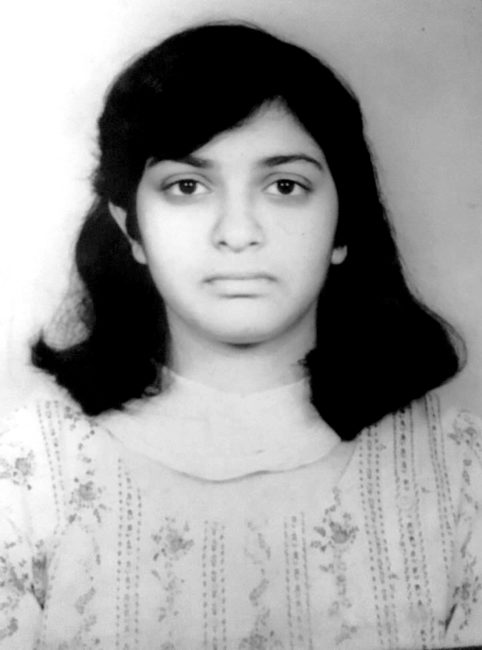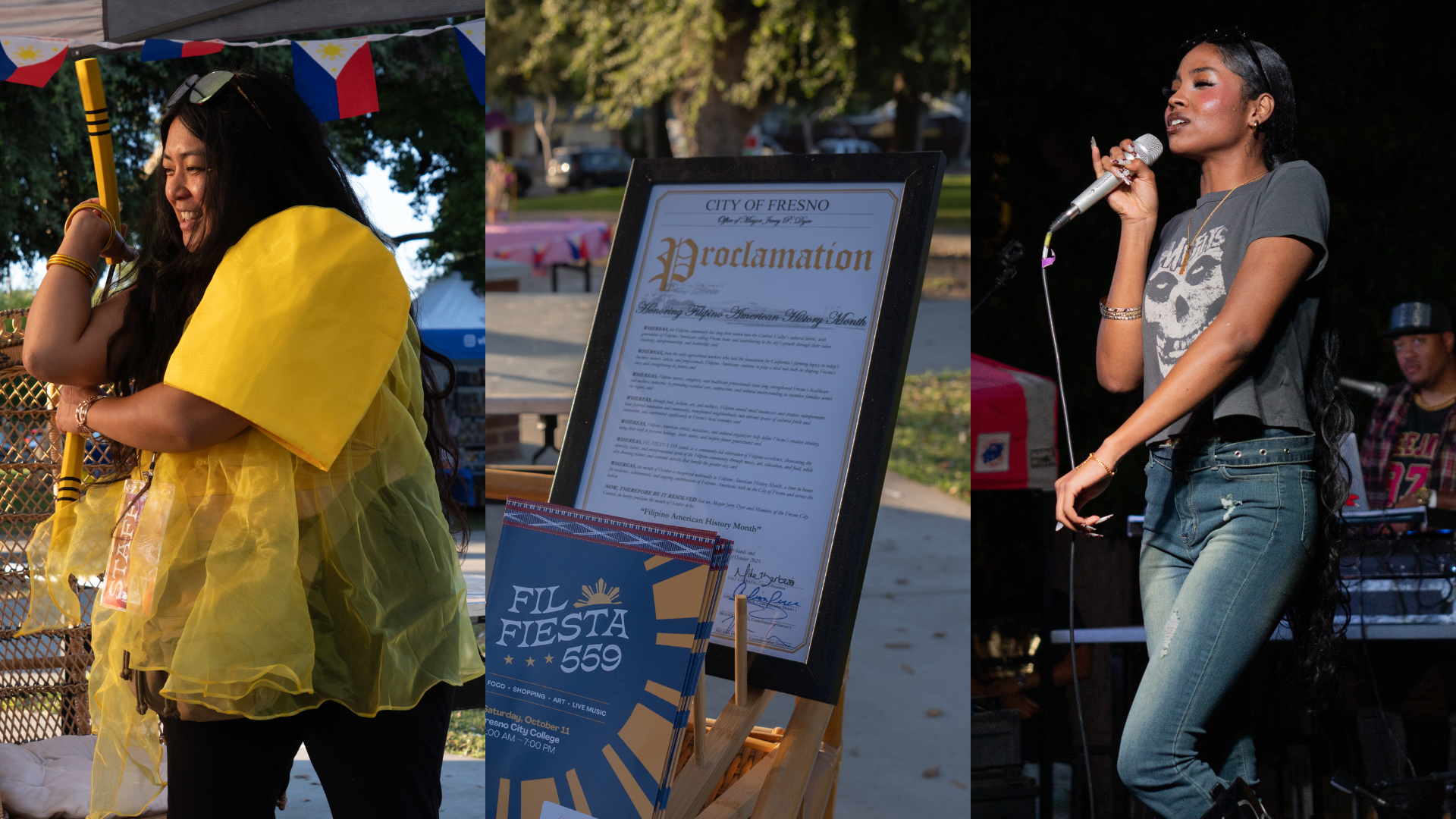
Chi·me·ra, noun
1. (in Greek mythology) a fire-breathing female monster with a lion’s head, a goat’s body, and a serpent’s tail.
2. a thing that is hoped or wished for but in fact is illusory or impossible to achieve.
I don’t know much. I know she didn’t always smile in pictures, I know she was set to attend Smith College and I know she was hanging from her bedroom ceiling fan on the 25th of Ramadan of her eighteenth year. I know that sometimes I get lost in the mirror trying to see her features in mine, but I always smile in pictures, I’m set to attend UC San Diego and I was surrounded by family celebrating me on the 25th of Ramadan of my eighteenth year.
I know she was my Rubina Khala, my auntie, and I know she couldn’t have known that she would be. I don’t know what she was like, the way she carried herself, the way she spoke. Staring into photographs in which she hovered, I try to learn. I’d like to romanticize her angst, to think she was a strong, rebellious, flame of a woman, with a fire that couldn’t contain itself or bend to the will of her parents. A flame that didn’t flicker out, but exploded, engulfing generations in the smoke of what once was.
Or maybe she wasn’t angry; maybe she was just treading through life on feet that couldn’t feel the ground and a head that couldn’t escape nimbus clouds. She didn’t have the resources to address how she felt — not the time nor the place of her existence allowed her that. Maybe all she knew was that she felt the way she did and that was enough to know she didn’t like it.
I am as old as she was. A month or two older, really, by the lunar Muslim calendar. I outlived her. I outlived her and I am living what could have been her American dream. It’s strange to think I am older than she will ever be. It’s strange to carry someone with you, not as a burden in the slightest but carried nonetheless.
I am Maya Bina, she was Rubina and I carry her with me because I love her and I am sorry. I am sorry that I have to imagine her in myself because I have no other frame of reference. I am sorry that she didn’t know what I know about mental health. And I am sorry that I don’t know if her knowing would have made a difference either way.
But mostly I am sorry that I can’t feel what she was feeling. I just want to understand her, but I can’t. I am ready for the next and she was ready for the end. She must have been determined; not even a full scholarship to an American college could discourage her from what she had set her mind to. I can’t understand but I want to. I want to know why, even though there’s hardly ever a reason for dying that the living can accept as valid.
 My mother’s family tree is a confusing mass of thick, heavy limbs weaving through political borders and arranged marriages, congested with the green leaves of cousins from who-knows-where. I can’t begin to climb it; although the branches support my weight, there’s no space to make it through. The top of the tree I can’t even see, can’t name, can’t visualize. No one around me can. But I am secure in my knowledge of the lower branches, the aunties and uncles with me, in presence or in spirit. I ponder Rubina Khala’s leaf, taken aback when my little cousins can’t see it, though she is their Rubina Khala, too. They don’t carry her. How could they? They don’t even know the little that I know. They’ve never seen her hovering in pictures.
My mother’s family tree is a confusing mass of thick, heavy limbs weaving through political borders and arranged marriages, congested with the green leaves of cousins from who-knows-where. I can’t begin to climb it; although the branches support my weight, there’s no space to make it through. The top of the tree I can’t even see, can’t name, can’t visualize. No one around me can. But I am secure in my knowledge of the lower branches, the aunties and uncles with me, in presence or in spirit. I ponder Rubina Khala’s leaf, taken aback when my little cousins can’t see it, though she is their Rubina Khala, too. They don’t carry her. How could they? They don’t even know the little that I know. They’ve never seen her hovering in pictures.
They’re younger than me, yes, the cousins I’m closest to. How do you tell them? Even Rubina Khala’s sister didn’t know until she was a teenager. You don’t know how, but you must. You have to. You can’t leave her here. You’ve taken her with you; now you have to tell them how to take care of her, how to hold her in the back of their mind, not so tight that she consumes their thoughts, but tight enough that they know she’s there. It’s their turn to carry her, as I do, as my brother does.
You have to tell them that she is absolutely nothing to be ashamed of carrying. That she is not a burden, but she is there. That for eighteen whole years she was really there, that she lived in your home and ate with you, argued with you, played with you. You have to tell them that she died, but you have to tell them that she lived and breathed and laughed and cried as they do. You have to tell them that Pakistan then was different from where they are in space and time, that they have so many resources available. You have to tell them that she is their Khala and she deserves to be carried.
And maybe, on the 25th of Ramadan of their eighteenth year, they will look for her features in theirs, and they will wonder how their life is this way and hers was that way. As they carry her, they might try to visualize the life that she lived. They might try to understand, though they may not be able to. But they will be thinking about her. You need to to tell them, so that they know that family will not be forgotten.
How do you love someone who felt so unloved that she didn’t allow herself to live long enough to know you? How do you feel when the air shifts on the day she was born or the day she died when the family remembers? How do you feel on the 25th of Ramadan of your eighteenth year when your family was too busy celebrating your life to remember her death?
Her mother remembered, though.
Do you allow yourself to feel the grief and guilt she must? Do you kick yourself, knowing the 25th of Ramadan will slip your mind multiple times in your lifetime, or do you find comfort in the fact that at least you know enough to feel the weight of the 25th of Ramadan? Staring in the mirror, I opt for the latter, my face replacing her imagined one as my eyes focus. She will not become a burden. She will always be carried without resentment, without self-directed anger. She will be carried with love.




